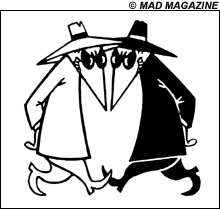
SPY VS. SPY: Goss may have been bad, but will Hayden be any better?
|
When Washington bigwigs want to dispose of a particularly nasty piece of trash, they break the news late in the day Friday. Their hope is twofold: that the news either will get lost in the more relaxed weekend news cycle or that the relatively muffled reaction to the development will buy them more time in which to get their acts in better order. As a rule, they’re driven by a bit of both. That’s just what happened when President Bush surprisingly and unceremoniously canned former conservative congressman Porter Goss as chief of the Central Intelligence Agency. Goss, of course, should never have been named in the first place. His appointment was another Bush blunder. He was, at best, a second-rate talent, a hack more interested in scoring partisan points than in making national policy. His very lack of substance no doubt held a certain appeal for Bush, who values reliability and loyalty over sagacity and know-how. But in the end, Goss was too inept for even this foreign-policy-challenged president.
For better or worse — and these days it’s usually for the worse — the CIA is supposed to be on the frontline of the nation’s defense. When Goss took over, the agency was already demoralized by its pathetic performance in the run-up to the Iraq war (“Look, Ma — no weapons of mass destruction!”) and compromised by political interference (“Don’t blame us — Dick Cheney made us do it!”). Goss, nevertheless, managed the impossible: by purging competent career officers and recruiting cronies, he rendered the CIA even more incompetent and demoralized. Neat trick.
Air Force four-star general Michael Hayden, whom Bush has nominated to succeed Goss, enjoys a reputation as a skilled bureaucratic infighter. The fact that he has not allowed himself to be bullied by the obnoxious Secretary of Defense Donald Rumsfeld is a point of sorts in his favor. But as head of the National Security Agency, the biggest (controlling almost 80 percent of intelligence funds) and most secretive of the nation’s 16 spy outfits, Hayden is intimately implicated by recent intelligence hot potatoes: the failure to adequately warn of the 9/11 attacks, the failure to accurately assess whether Iraq had existing chemical weapons and an ongoing nuclear-weapons effort, and the aggressive and illegal program to eavesdrop on domestic telephone and Internet communications. It’s quite a profile. Only Cheney and Rumsfeld, the architects of Bush’s Iraq war, have a stronger record.
Despite some welcome objections raised by congressional Republicans, Hayden will most likely be confirmed. His role in Bush’s warrantless domestic-spying program will most likely — and perversely — redound to his and Bush’s favor. Bush may enjoy a pathetic public-approval rating of 31 percent, but the nation is about evenly divided when it comes to supporting Bush’s unconstitutional internal surveillance. By tapping into a latent vein of bonehead sentiment, Bush will replace a bad guy with the wrong guy.
Bush is guilty of many things, but perhaps his most heinous, ongoing crime is playing Russian roulette with the nation’s security. As a result of his war with Iraq and his threatened war with Iran, we are less safe, less secure, and less free. Hayden’s appointment will keep the gun to our head.
Score one for the good guys
When a Maryland jury sentenced self-confessed terrorist Zacarias Moussaoui to life in prison without parole, rather than death, 12 average men and women selected by chance struck a blow against Bush’s war on terror — not against the president’s inept war against foreign threats, but against Bush’s efforts to scare the devil out of Americans so that they will ignore his foreign adventures and accept his unconstitutional constraints on liberty at home. Even in the face of extraordinary efforts by federal prosecutors bent on vengeance — as opposed to justice — who needlessly prolonged the Moussaoui trial by seeking the death penalty, the jurors opted for justice. Moussaoui is in all likelihood a marginal figure in the 9/11 attacks. And his courtroom demeanor, up to and including his last-minute claim that he concocted his confession, suggests he may be more wingnut than warrior. He’s certainly of secondary importance compared with Khalid Sheikh Mohammed, the Al Qaeda agent who was held in secret prisons without counsel for almost three years. Why has he never been brought to trial? And why will he, in all probability, never be tried? Could it be that the Bush administration fears that accusations of torture will surface? Bush, by overreaching in the case of Moussaoui, sought to divert attention from Khalid Mohammed. The jury did not fall for the feint. By deciding as they did, the anonymous jurors — shielded for their own protection — sent the nation and the world a message of which we should all be proud. Justice, in short supply these days, was served.